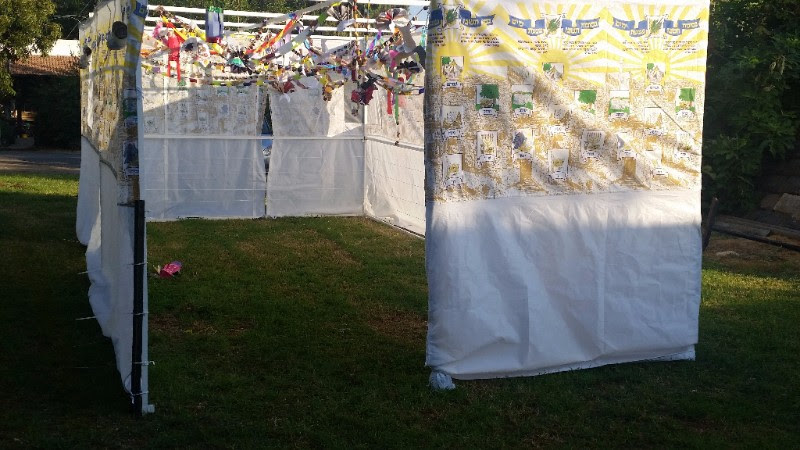Walk through any community in Israel this evening and you will be surrounded by by children playing and families greeting each other under shelters constructed from fabric and foliage. It is the festival of Sukkot, also called the Feast of Tabernacles.This celebratory occasion comes on the heels of the period of self-analysis from Rosh HaShanah to Yom Kippur known as the Yamim Nora’im (“Days of Awe”).
At Sukkot, meaning ‘booths’ in Hebrew, families gather together to build a sukkah (booth) and decorate it often with handmade decorations. It is a wonderful activity to do with the kids. Community sukkot are also built at schools, kindergartens and day cares for the children to take their meals in for the duration of the holiday.
Sukkot is one of the pilgrimage festivals, the only one that takes place in autumn. In Israel, it is a glorious time of year to be out in our temporary shelters meeting, eating, singing and sleeping. The holiday originated as an agricultural feast, centered on rejoicing in the bountiful harvest from the Lord as commanded in Deuteronomy 16:13-17:
“For seven days celebrate the festival to the Lord your God at the place the Lord will choose. For the Lord your God will bless you in all your harvest and in all the work of your hands, and your joy will be complete.” (verse 16)
One of the important aspects of Sukkot is the commandment to rejoice: “Be joyful at your Feast” (Deut.16:14). This is a reminder to thank the Lord for his provision. Originally, Sukkot had strong ties to the land and was thus a feast to celebrate the harvest. Today, in our rich and plentiful society, the agricultural ties can have less literal meaning. Sukkot is a time to reflect upon and thank the Lord for our own “harvest,” both literally, for the food we have, and also spiritually, for the metaphysical provision from God.
The temporary shelters made during Sukkot are a homage to the temporary dwellings of the Israelites in the desert after their escape from Egypt. In a similar vein to Pesach, another pilgrimage festival, Sukkot is a time to recall the Lord’s providing for and protecting His people. This has a special significance as the festival evokes gratitude and also brings to mind the times when the Lord has rescued His people from adversity.
When you are removed from the safety of your home and relocated to the insubstantial sukkah, you turn towards the Lord’s strength as the Lord dwells with those who believe in Him. Therefore, Sukkot is time of reflection and celebration upon the gift of God’s dwelling with us, His faithful. We give thanks for God’s presence with us.
Sukkot presents an opportunity as a time for retrospective pondering to the Biblical roots of the festival. But it is also be a time of looking forward to our ultimate redemption. Therefore, at the pilgrimage festival of Sukkot, it is important to rejoice, as we are commanded. We rejoice in God’s provision and protection. And we rejoice in all that is to come.
| 






